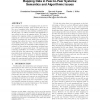Free Online Productivity Tools
i2Speak
i2Symbol
i2OCR
iTex2Img
iWeb2Print
iWeb2Shot
i2Type
iPdf2Split
iPdf2Merge
i2Bopomofo
i2Arabic
i2Style
i2Image
i2PDF
iLatex2Rtf
Sci2ools
108
click to vote
SIGMOD
2003
ACM
2003
ACM
Mapping Data in Peer-to-Peer Systems: Semantics and Algorithmic Issues
We consider the problem of mapping data in peer-topeer data-sharing systems. Such systems often rely on the use of mapping tables listing pairs of corresponding values to search for data residing in different peers. In this paper, we address semantic and algorithmic issues related to the use of mapping tables. We begin by arguing why mapping tables are appropriate for data mapping in a peer-to-peer environment. We discuss alternative semantics for these tables and we present a language that allows the user to specify mapping tables under different semantics. Then, we show that by treating mapping tables as constraints (called mapping constraints) on the exchange of information between peers it is possible to reason about them. We motivate why reasoning capabilities are needed to manage mapping tables and show the importance of inferring new mapping tables from existing ones. We study the complexity of this problem and we propose an efficient algorithm for its solution. Finally, we pre...
Related Content
| Added | 08 Dec 2009 |
| Updated | 08 Dec 2009 |
| Type | Conference |
| Year | 2003 |
| Where | SIGMOD |
| Authors | Anastasios Kementsietsidis, Marcelo Arenas, Renée J. Miller |
Comments (0)

